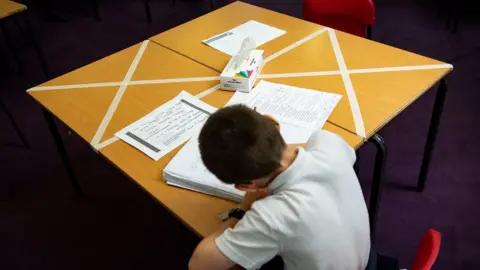Support for special needs pupils by Education Authority to be reviewed
 Jacob King/PA Wire
Jacob King/PA WireThere is to be an independent, external review of how the Education Authority (EA) supports children with special educational needs (SEN).
The Department of Education (DE) has not given a timescale for the review but said it would begin "as soon as possible."
It follows a highly critical Stormont report into failings in the EA's services for children with SEN.
MLAs also heard that public confidence in the EA had been "totally shattered".
The Public Accounts Committee (PAC) report is the most recent of a number of damning reports into how the EA has failed to support some children with SEN.
In February 2020, the EA apologised after an internal report identified multiple failings.
The NI Audit Office (NIAO) subsequently questioned if the EA's procedures for pupils with SEN were "fit for purpose".
'Totally shattered'
Rachel Hogan from the Children's Law Centre told assembly members (MLAs) on Stormont's Education Committee those reports reflected what parents, children and external organisations had known for years.
"Public confidence in the EA as a public authority, which was already extremely fragile, has now has been totally shattered," she said in a written briefing to the committee.
"Disability discrimination against children has become institutionalised within our education system."
Ms Hogan said delays in getting children appropriate help had been "responsible in some cases for blocking access to education for disabled children and young people."
"We see this when children with SEN are sent home early from school or placed on part-time timetables for prolonged periods; when they are isolated or segregated from peers," she continued.
She also said some children with disabilities had been subject to "unregulated restraint," or not allowed to be in school plays, or go on school trips.
Others, she said, had been "suspended or expelled for behaviour arising from disability in the absence of special educational provision."
Committee vice-chair, Sinn Féin MLA Pat Sheehan, said Ms Hogan had given an "absolutely withering critique" of the EA's performance.
But the head of the EA Sara Long subsequently denied that children with disabilities had faced "institutional discrimination" in response to the committee chair, Alliance MLA Chris Lyttle.
"The Education Committee has heard today that the extent to which children and families with special educational needs have been failed by our educational system amounts to institutionalised discrimination against children with disabilities," Mr Lyttle said.
"How would you react to that statement?"
"I'm not sure that's the terminology that I would use - no," Ms Long said.
"What I would say is, and I've said before, they have been failed and we can do better, and we should do better and we will do better."
"We have acknowledged the significant programme of work that needs to be undertaken."
Ms Long told MLAs that the EA was facing more than 150 recommendations for change but said some progress had been made.
She said, for example, that as of 31 March no child had been waiting over 26 weeks for their statutory assessment of SEN to be completed.
She said that had come down from around 1,000 children waiting more than 26 weeks in November 2019.
Ms Long said other "systemic and cultural" change would take time but the EA was "committed" to that.
The independent review of the EA's support for children with SEN has just been confirmed in a response to the PAC report from the Department of Education.
It will evaluate how effective support for children with SEN is, why there is a higher proportion of children in Northern Ireland with SEN than England and how services to support them are funded.